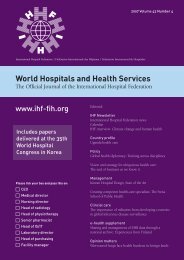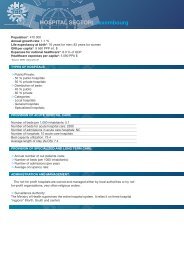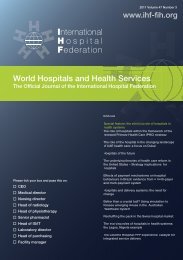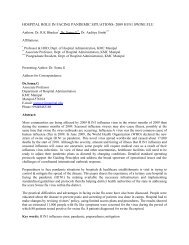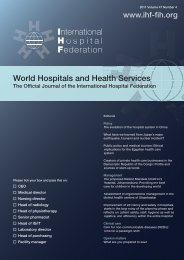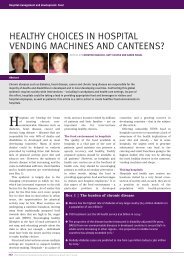World Hospitals and Health Services - International Hospital ...
World Hospitals and Health Services - International Hospital ...
World Hospitals and Health Services - International Hospital ...
Create successful ePaper yourself
Turn your PDF publications into a flip-book with our unique Google optimized e-Paper software.
POLICY: THE HEALTH SOCIETY<br />
HIV/AIDS) <strong>and</strong> medical expert systems (privatisation of<br />
health care <strong>and</strong> increasing patient/consumer power). The<br />
latest incarnation of these developments is the wellness<br />
revolution which marries personal health <strong>and</strong> the market:<br />
the do-ability of health translates into a product that can be<br />
bought on the market.<br />
What are the defining characteristics of the health society?<br />
➜ demographics, a high life expectancy <strong>and</strong> an increasingly<br />
ageing population;<br />
➜ an expansive health <strong>and</strong> medical care system that takes<br />
up increasing parts of the GNP;<br />
➜ an exp<strong>and</strong>ing health market for information, products<br />
<strong>and</strong> services both alongside (for example wellness) <strong>and</strong><br />
within the medical system;<br />
➜ the increasing prominence of health in the debate about<br />
political <strong>and</strong> social priorities, about solidarity rights <strong>and</strong><br />
responsibilities;<br />
➜ the increasing importance of health as a major personal<br />
goal in life linked to its do-ability;<br />
➜ <strong>and</strong>, finally, health as a key component of modern<br />
citizenship.<br />
The mega trend of the expansion of the health territory is<br />
a fact, as is its increasing do-ability. It is a response to social,<br />
demographic <strong>and</strong> technological changes <strong>and</strong> it indicates that<br />
a discourse that focuses on medicalisation or cost control is<br />
out of sink with a view of health as part of life politics. The<br />
definition of what is disease <strong>and</strong> what is health <strong>and</strong> which<br />
action <strong>and</strong> intervention belongs to which governance system<br />
is becoming increasingly difficult – the system of order is<br />
upset <strong>and</strong> is being redefined. And this redefinition is<br />
increasingly being driven by citizens/patients <strong>and</strong><br />
consumers.<br />
A healthy (more or less) <strong>and</strong> long life have become the<br />
norm in developed Western modern societies <strong>and</strong> – because<br />
of the expansion of territory – the disease has been<br />
normalised <strong>and</strong> integrated into society, as symbolized by the<br />
AIDS <strong>and</strong> breast cancer ribbons. The do-ability of health<br />
exp<strong>and</strong>s the legal territory of rights: the litigation cases<br />
against the tobacco <strong>and</strong> the fast food companies are a case<br />
in point as is the debate around TRIPS in the <strong>World</strong> Trade<br />
Organization.<br />
The expansion of territory means that it becomes<br />
increasingly difficult to define boundaries, for example<br />
between health <strong>and</strong> beauty or between pharmaceuticals/<br />
food/drugs. In the United States the term ‘cosmetic<br />
psychopharmacology’ describes the increased acceptance of<br />
using pharmaceuticals to produce personal well-being in<br />
everyday life. ‘La perfectabilite de l’homme’ first proclaimed<br />
as part of a political programme with the Enlightenment is<br />
increasingly possible as a personal consumer choice.<br />
The development of the health society is part of a general<br />
change in social values linked to modernity which are<br />
usually described with the following characteristics:<br />
➜ individualisation;<br />
➜ differentiation;<br />
➜ recognition of the value of autonomy <strong>and</strong> selfresponsibility;<br />
“<br />
A healthy (more or less) <strong>and</strong><br />
long life have become the norm<br />
in developed Western modern<br />
societies <strong>and</strong> – because of the<br />
expansion of territory – the<br />
disease has been normalised<br />
<strong>and</strong> integrated into society, as<br />
symbolized by the AIDS <strong>and</strong><br />
breast cancer ribbons.<br />
”<br />
➜ subjective/holistic well being;<br />
➜ high expectations;<br />
➜ quality of life.<br />
This move towards individualisation, privatisation <strong>and</strong> the<br />
commercialisation of health is one expression of larger<br />
trends in modern societies. It widens the debate from the<br />
classic approach to regulate industries that produce ill<br />
health (such as tobacco or junk food) to creating a consumer<br />
movement towards products <strong>and</strong> services that create health.<br />
But the danger of widening the health gap grows, as the<br />
healthy <strong>and</strong> better off buy an ever increasing amount of<br />
health promotion while cuts in the public sector not only<br />
reduce prevention <strong>and</strong> health education services for the<br />
poor (for example nutrition education) but also weaken<br />
public safeguards on harmful goods <strong>and</strong> services (for<br />
example, access to <strong>and</strong> advertising of soft drinks <strong>and</strong> junk<br />
food in United States schools).<br />
This implies a radical new era of health policy, which will<br />
be increasingly consumer driven <strong>and</strong> constantly in danger of<br />
losing its commitment to solidarity – risk solidarity <strong>and</strong><br />
generational solidarity – <strong>and</strong> inclusion. In particular the<br />
continuous processes of individualisation have widened<br />
choices <strong>and</strong> life options (empowerment) but have also led to<br />
an increased delegation of risk management to the<br />
individual, the family the community. Increasing parts of<br />
health governance have moved to the market place<br />
excluding those with no buying power. And as the do-ability<br />
of health increases so do the dangers inherent in a quest for<br />
‘la perfectabilite de l’homme’.<br />
The health society needs the active involvement of<br />
citizens, patient’s organizations, health literate consumers<br />
<strong>and</strong> social movements in order to avoid the increased<br />
privatisation of risk <strong>and</strong> to counter act the establishment of<br />
health as only a market value or indeed as an ultimate value.<br />
That is why groups such as IAPO will gain increasing<br />
importance in shaping the future of the health society – that<br />
the key value remains the empowerment of the citizen <strong>and</strong><br />
the acceptance of health as a public good. ❑<br />
This paper was first given at an IAPO Reception in Geneva, 12<br />
July 2004<br />
14 | <strong>World</strong> <strong><strong>Hospital</strong>s</strong> <strong>and</strong> <strong>Health</strong> <strong>Services</strong> | Vol. 40 No. 4



